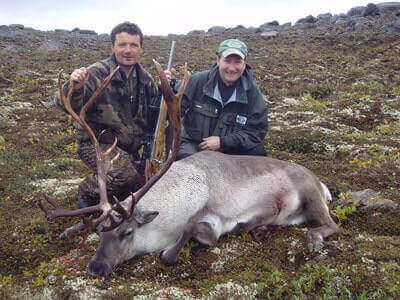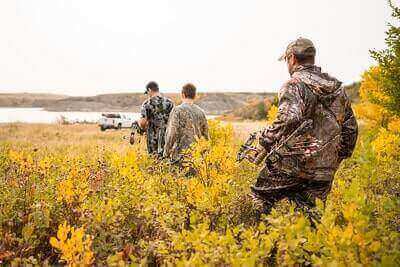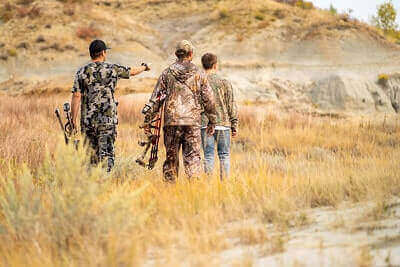Disclosure: We may earn commissions if you purchase products after clicking on a link from our site.
Hunting has been a way of life for humans from the early days and there are many benefits of hunting. Humans learned and perfected the skill of hunting to provide food. Today, we have large-scale agricultural projects that make us less reliant on hunting as our main source of food.
However, many people still hunt as a sport while there is a minority that still hunts to provide game meat for consumption. In this article, we share the benefits of hunting. Hunting is an old tradition, not only in the United States but worldwide that is practiced by millions.

Table of Contents
Benefits of Hunting
1. Food Source
Hunting serves as an important source of food for many individuals and communities, offering a sustainable and nutritious alternative to store-bought meats. Wild game, such as deer, elk, rabbit, and waterfowl, provides lean protein and essential nutrients, including iron, zinc, and B vitamins, contributing to a balanced and healthy diet.
Unlike factory-farmed meat, which may contain additives and hormones, wild game is free from artificial ingredients and raised in its natural environment. Additionally, hunting allows individuals to have a deeper connection to their food sources, fostering an appreciation for the natural world and where their meals come from.
For many hunters, the process of harvesting and preparing wild game is a cherished tradition passed down through generations, further enhancing the value of this food source. Moreover, hunting promotes self-sufficiency and resilience by reducing reliance on commercial food systems and providing an alternative food source during times of need or emergency.
Overall, hunting as a food source offers individuals the opportunity to enjoy fresh, healthy, and sustainable meat while strengthening their connection to nature and traditional food practices.
2. Helps The Ecosystem
Hunting plays a crucial role in helping to maintain healthy ecosystems by managing wildlife populations and preserving biodiversity. Through carefully regulated hunting practices, animal populations, and deer population, in particular, can be controlled to prevent overpopulation, which can lead to habitat degradation and resource depletion.
By harvesting game animals, hunters help to balance wildlife populations with the carrying capacity of their habitats, ensuring that the local ecosystem remains in equilibrium. Additionally, hunting can help control the spread of invasive species, which can disrupt native ecosystems and outcompete native species for resources.
Moreover, revenue generated from hunting licenses and fees often funds conservation efforts, such as habitat restoration, land acquisition for wildlife refuges, and scientific research on wildlife populations. Furthermore, hunters often participate in habitat improvement projects, such as planting native vegetation, and food plots, and removing invasive species, which enhance habitat quality for wildlife.
Overall, hunting contributes to the health and sustainability of ecosystems by managing wildlife populations, preserving biodiversity, and supporting conservation efforts.

3. Funds Conservation & Wildlife Programs
Hunting plays a significant role in funding wildlife and conservation programs, providing vital support for the management and preservation of natural resources. Revenue generated from hunting license fees and license sales, tags, permits, and excise taxes on hunting equipment and firearms contributes billions of dollars annually to state and federal wildlife agencies.
These funds are allocated to various conservation initiatives, including habitat restoration, species conservation, research, and education programs. Additionally, hunting organizations and conservation groups often collaborate with government agencies to raise additional funds through donations, memberships, and fundraising events.
Furthermore, hunters actively participate in conservation efforts by volunteering their time and expertise for habitat improvement projects, wildlife monitoring, and scientific research. By contributing to the funding of wildlife and conservation programs, hunters play a crucial role in protecting and preserving natural habitats and wildlife populations for future generations to enjoy.
4. Supports The Economy
Hunting provides significant support to local and national economies through various channels, making it an essential contributor to economic growth and development. The hunting industry generates substantial revenue through the sale of hunting licenses, permits, tags, and related fees, which fund wildlife management programs and conservation initiatives.
Additionally, hunters contribute to local economies by purchasing hunting equipment, firearms, ammunition, clothing, and accessories, stimulating business activity in the retail and manufacturing sectors. Hunting also drives tourism and outdoor recreation, attracting visitors to rural and wilderness areas for hunting trips, guided hunts, and outdoor adventures.
Furthermore, hunting-related expenditures support jobs in sectors such as hospitality, lodging, food services, transportation, and outdoor recreation services, providing employment opportunities and income for the state economy.
Moreover, hunting stimulates economic activity in related industries, including agriculture, forestry, and land management, by promoting sustainable land use practices that benefit both wildlife and the economy. Overall, hunting plays a vital role in supporting economic prosperity, job creation, and community development in regions where hunting is practiced.
A hunter, on average, will spend $2,000.0 per year on retail hunting-related goods. Additionally, local hotels, motels, restaurants, car rental companies, etc. all benefit from the hunting season.

5. Promotes Healthy Lifestyle
Hunting promotes a healthier lifestyle by encouraging physical activity, fostering a deeper connection to nature, and providing access to nutritious, organic food. Engaging in hunting requires individuals to spend time outdoors, often traversing varied terrain, which promotes cardiovascular health, muscle strength, and endurance.
Furthermore, hunters must exhibit patience, focus, and agility while navigating through forests, fields, or mountains, enhancing mental acuity and physical coordination. Additionally, hunting allows individuals to immerse themselves in natural environments, providing stress relief and mental rejuvenation through exposure to fresh air, sunlight, and natural landscapes.
Moreover, hunting provides an opportunity to source lean, protein-rich meat directly from the wild, free from hormones, antibiotics, and artificial additives often found in store-bought meats. The process of harvesting, processing, and preparing wild game promotes self-sufficiency and fosters an appreciation for where food comes from, encouraging healthier dietary choices and sustainable living practices.
Overall, hunting promotes a holistic approach to health and wellness, encompassing physical, mental, and nutritional aspects of a healthy lifestyle.
Getting in good physical condition will only improve your chances of success during the hunting season. Mentally, you get stronger as you learn to not easily give up, focus, learn from your mistakes, and problem-solve. Hunting helps you live a healthy life.
Pros And Cons Of Hunting
| Pros | Cons |
|---|---|
| Wildlife Population Control | Safety Risks |
| Promotes Healthy Lifestyle | Encourages Unethical Practices |
| Connect With Nature | May Result In Animal Suffering |
| Supports Economies | |
| Funds Conservation Programs | |
| Develops Your Personality | |
| Strengthens Family Bonds | |
| Participates In Community | |
| Protein Source | |
| Provides Wildlife Data |
6. Connect With Nature
Hunting offers individuals a unique opportunity to connect with nature on a profound level, fostering a deep appreciation for the great outdoors and its inhabitants. As hunters venture into forests, fields, mountains, or wetlands, they become immersed in the sights, sounds, and rhythms of the wilderness.
The experience of observing wildlife in its natural habitat, from elusive deer to majestic birds of prey, allows hunters to develop a deeper understanding of ecosystem dynamics and the interconnectedness of all living things.
Moreover, spending time in nature while hunting provides a sense of solitude and tranquility, offering a reprieve from the hustle and bustle of daily life and allowing individuals to recharge and rejuvenate their spirits.
Additionally, hunters develop a keen awareness of seasonal changes, weather patterns, and environmental conditions, further deepening their connection to the natural world. Ultimately, hunting provides a profound opportunity for individuals to forge a meaningful bond with nature, instilling a sense of stewardship and responsibility for the preservation and conservation of our planet’s precious ecosystems. Hunting provides numerous health benefits as it can serve as a natural antidepressant as well as mental health benefits and social benefits.
7. Enhances Your Personality
Hunting can enhance personality traits such as patience, perseverance, development of survival skills, and self-reliance, making it a valuable pursuit for personal development. Patience is a key virtue in hunting, as success often requires waiting for the right opportunity to present itself.
Hunters learn to remain calm and focused during long periods of observation, honing their ability to exercise restraint and discipline. Additionally, hunting demands perseverance in the face of challenges and setbacks, such as adverse weather conditions or elusive games. Overcoming these obstacles builds resilience and determination, fostering a stronger sense of self-confidence and accomplishment.
Furthermore, hunting encourages self-reliance as hunters must rely on their skills, knowledge, and instincts to navigate the wilderness and harvest game effectively. This self-sufficiency cultivates independence and resourcefulness, empowering individuals to tackle challenges both in the field and in everyday life. Overall, hunting can significantly enhance one’s personality by promoting valuable traits such as patience, perseverance, and self-reliance, contributing to personal growth and development.

8. Improve Family Relations
Hunting can improve family relations by providing opportunities for shared experiences, bonding, and communication in a natural and stimulating environment. For many families, hunting serves as a cherished tradition passed down through generations, fostering a sense of connection to the land and wildlife.
Family members often work together to plan hunting trips, prepare gear, and navigate hunting grounds, promoting teamwork and collaboration. Additionally, time spent in the outdoors while hunting allows families to escape the distractions of modern life and focus on each other, strengthening familial bonds and creating lasting memories.
Furthermore, hunting provides a platform for teaching important life skills and values, such as respect for nature, ethical hunting practices, and conservation stewardship, instilling these principles in the younger generation.
Moreover, shared successes and challenges experienced while hunting can deepen familial camaraderie and mutual respect, fostering a sense of unity and cohesion within the family unit. Overall, hunting can enhance family relations by fostering meaningful connections, promoting teamwork, and imparting valuable life lessons, contributing to a stronger and more cohesive family dynamic.
9. Participate In Community Programs
Hunting offers individuals the opportunity to participate in programs of the local communities that are focused on wildlife conservation, habitat restoration, and outdoor education, highlighting the multifaceted benefits of hunting beyond the pursuit of game.
Many hunting organizations and conservation groups organize community programs and events aimed at promoting responsible hunting practices, fostering environmental stewardship, and educating the public about the benefits of hunting.
These programs may include volunteer opportunities for habitat improvement projects, wildlife monitoring initiatives, and outdoor skills workshops, providing participants with hands-on experience and knowledge-sharing opportunities.
Additionally, hunting-related events such as fundraisers, banquets, and educational seminars serve as platforms for community engagement and networking among hunters, conservationists, and outdoor enthusiasts. By participating in these community programs, hunters contribute to the collective effort to conserve natural resources, preserve wildlife habitats, and promote the sustainable use of wildlife for future generations to enjoy.
10. Provides Data For Research
Hunting plays a valuable role in providing data for scientific research, contributing to a better understanding of wildlife populations, disease control, animal behavior, climate change, and ecosystems. Hunters often collect data through observation, harvest reports, and participation in citizen science programs, providing researchers with valuable information on population dynamics, habitat use, and species distribution.
This data is essential for informing wildlife management decisions, setting hunting regulations, and implementing conservation strategies aimed at maintaining healthy and sustainable wildlife populations.
Furthermore, hunting provides researchers with access to specimens for scientific study, including tissue samples for genetic analysis, which can help elucidate evolutionary relationships and inform conservation genetics efforts.
By participating in hunting activities and sharing their observations and experiences, hunters contribute valuable data that enhances our knowledge of wildlife biology and ecology, ultimately benefiting the management and conservation of wildlife populations and ecosystems for future generations to enjoy.
The Bottom Line
Hunting is a major outdoor activity for millions of people worldwide as it not only provides a source of protein but also a way to interact with nature. There are many benefits of hunting from the economic benefits to the physical and mental benefits.
A hunting trip that becomes a successful hunt not only provides game meat but also gives you social and mental benefits. Additionally, you disconnect from the demands of modern living and connect with family and friends through outdoor activity. In this article, we shared some of the benefits of hunting to help you understand the unique role it plays in society.
We also wrote articles on how to hunt, how to hunt on public land, how to introduce your kids to hunting, how to hunt with bows, how to hunt with recurve bows, and how to hunt deer at night if you would like to read more hunting articles and get some tips to improve your hunting skills. If you go fishing, you can also read about the benefits of fishing.